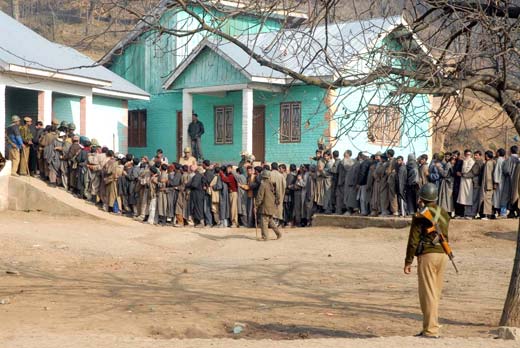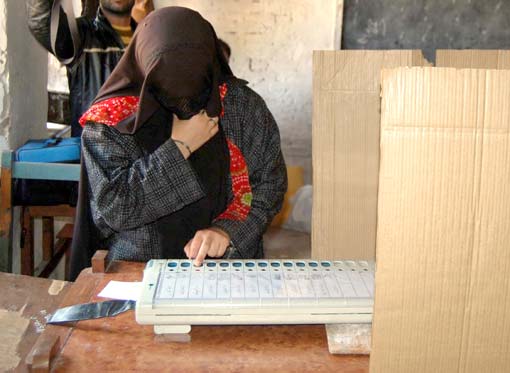Interestingly Supreme Court’s decision to have negative voting options in upcoming elections hardly excited any separatist leader in Kashmir. Reason! Separatists appartently think that even pressing the negative vote button means accepting India’s sovereignty over Kashmir. Shah Abbas reports.

If boycotting election process and rejecting the contesting candidates is one and the same thing, then the separatists will be participating in the coming elections without nominating any candidate and even without filing any nominations. They will not have even to take any oath of faithfulness towards the country and its constitution.
Supreme Court of India, in the last week of September, announced a land mark decision by virtue of which the citizens will have a right of negative voting.
The decision has come at a time when parliament and assembly elections are due next year.
The Supreme Court held that citizens have right to cast negative vote rejecting all candidates contesting polls, a decision which would encourage people not satisfied with contestants to turn up for voting. It probably can enhance the political process to those who out rightly reject it or are annoyed with it.
The apex court directed the Election Commission to provide ‘none of the above’ options at the end of the list of candidates in electronic voting machines (EVMs) and ballot papers to allow voters to reject those contesting polls.
Separatists in Kashmir, propagate election boycott for a time period of two and a half decades. Elections may be a ‘non-issue’ for some of them but largely they want people to stay out of the election process.
The separatists complain that they are not being allowed to campaign in favour of poll boycott but the Supreme Court verdict can now enable them to ask people to reach the polling booths and reject all the candidates.
“By this the separatists can make their point by using the same system they are opposed to,” an expert said.
Dr Sheikh Shawkat, who teaches law at university level, is of the opinion that separatists are unlikely to use the Supreme Court decision and ask people to go and press the negative voting button. “I do not think that separatists are likely to use it because there is a deficit of trust,” Sheikh said.
Strangely, the frontline separatist leaders did not even react to the Supreme Court verdict clearly indicating that they feel ‘trapped’.
“We are challenging the Indian sovereignty in Jammu and Kashmir that is why we appeal people to stay out of the election process, if we decide to use the Supreme Court verdict and appeal people to come out and press the button of negative voting then we will be somehow endorsing the Indian system and negating our own stand”, Nayeem Ahmad Khan, a senior separatist leader told Kashmir Life.
Khan added “when we say that people should refrain from voting we do not mean that we are against the contesting candidates whom we call pro-Indians but against the Indian system of which they are a part and practically endorse that so it is not the matter of rejecting votes by virtue of negative voting but fact of the matter is that we do not want our people to become a part of the system which has grabbed our freedom.”
But it is a fact that negative voting will overall increase the participation of people in the election process.
“The decision will help raise the voting percentage by giving an option to those, who otherwise boycott the entire election process,” an expert said, adding “this perhaps can also carry out an objective of India as for as Kashmir is concerned.
By virtue of the Supreme Court verdict, those who somehow keep themselves away from the political process will have a chance to be a part of it. “The basic aim of this verdict is to get those people into the political process who somehow keep distance from it and propagate to do so,” a legal expert pleading anonymity, told Kashmir Life.
Although, ordinary people by and large welcome the decision, some experts pointed out the pitfalls in negative voting.
Even the bench, while pronouncing out the operative portion of the judgment, did not throw light on a situation in case the votes cast under no option head outnumber the votes got by the candidates.
However, it said that secrecy of votes cast under the no option category must be maintained by the Election Commission.

Now a voter can register his dissent and that too against the candidates only not against the system, but it will not affect the outcome of the elections because the winner will still be decided on the basis of positive votes. So, there is no inspiration for an annoyed voter to stand in the queue to cast his negative vote.
“The major problem with negative voting is that if the number of votes cast rejecting all the candidates is more than what the candidates polled then the election will have to be void and that would make the entire electoral process a meaningless exercise,” the expert said, adding, “no electoral democracy can afford to have such a system as the very purpose of election is to choose from the available candidates.”
A bench in the Supreme court headed by Chief Justice, Justice P Sathasivam while delivering the judgment said that negative voting would promote purity and enthusiasm of elections and ensure wide participation as people who are not satisfied with the candidates in the fray would also turn up to express their opinion by rejecting the contestants.
They added that the concept of negative voting would bring a systemic change in the election process as the political parties will be forced to project clean candidates in polls.
The bench noted that the concept of negative voting is common in thirteen countries and even in India, parliamentarians are given an option to press the button for abstaining while voting takes place in the House.
The court said right to reject candidates in elections is part of fundamental right to freedom of speech and expression given by the Constitution to Indian citizens.
Electronic Voting Machines (EVMs) will now have an option to reject a vote so that if any voter does not like any of the candidates he can also use his right to franchise even without voting any candidate.
The Supreme Court passed the order on a PIL filed by an NGO, ‘People’s Union for Civil Liberties’ (PUCL) which had submitted that voters must be given the right to negative voting.
The latest verdict is part of the series of judgements passed by the apex court on the election process. Earlier, the apex court had restrained people in custody from contesting elections.
Negative voting, for long, had been a major point of debate but to test its full impact over the democratic process is to be seen. In any case, it serves as a warning bell for political parties as far as the fielding of candidates are concerned.
“The decision of the Supreme Court has to be welcomed because it has made youngsters like us aware about such a right that exists under the people’s representative act”, said Shaheena,(name changed) a third semester student of law in Kashmir University.
“I hope the decision will help in cleansing the political system as the voters are now empowered to reject the candidates found to be corrupt or inefficient”, she added.

